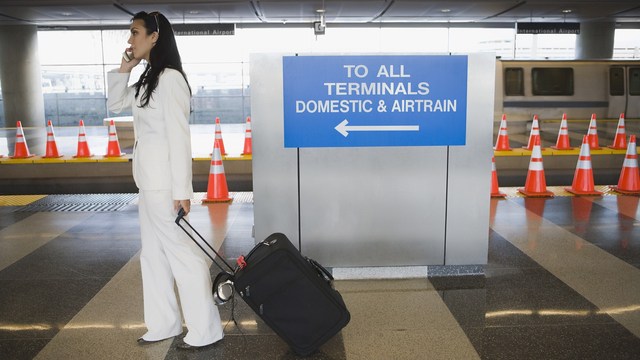 PS Productions/PhotoSpin
PS Productions/PhotoSpin
Thanksgiving, Christmas and New Year’s are among the busiest long-distance travel periods of the year, increasing as much as 54 percent, according to the U.S. Department of Transportation.
Crowded roads, bus and rail terminals and airports can make holiday travel a logistical labyrinth that can even intimidate adrenalin junkies. So if you or a loved one is living with cancer, taking a trip might seem downright daunting.
Before finalizing your much-anticipated travel plans there are a few things you should be aware of. A cancer diagnosis doesn’t necessarily mean you can’t travel, but it does mean you have to plan ahead and take special steps to ensure it’s done safely.
Start by talking with your doctor. Find out if its safe for you to travel and discuss any limitations.
Air travel, for example isn’t safe for people with brain tumors because reduced oxygen levels, air pressure changes and high altitude can increase swelling in the brain.
Air pressure changes during a flight can also trigger swelling in the arms, legs, or other parts of the body, a condition called lymphedema. This can be particularly troublesome for breast cancer patients who have had lymph nodes removed, according to the American Society of Clinical Oncology (ASCO).
Flying should also be avoided if you have undergone surgery in the last 10 days as it may cause painful gas that could stretch the incision wound, or if you are at risk of blood clots, which can be life threatening.
If you or a loved one is receiving chemotherapy, ask your doctor about any potential risks of traveling between treatments. Discuss any concerns you might have about seeking emergency medical care in the event a serious and potentially life-threatening side effect develops, such as a high fever which is a common sign of infection.
Once you have been cleared for travel, the ASCO offers these tips:
• Medications
Keep all prescription medications in their original containers to avoid mix-ups and place in carry-on baggage to prevent them from being inaccessible, lost or stolen. Bring extra supplies in case your return trip should be delayed for an extended time.
If you have syringes and needles for injections, ask your doctor to write a note explaining why it is medically necessary to carry these supplies. You may be required to show the note to TSA agents or customs officials.
If traveling by car, don’t store medication in the glove compartment or trunk that may become hot or humid. This can alter how some medications work.
• Take Medical Information with you
Ask your doctor to write a summary containing your medical and drug instructions, any allergies, your diagnosis and your treatment plan. Keep this summary, emergency contact numbers, and information with you during the trip.
If you are traveling internationally consider translating this information into other languages and carrying flash drives with copies of important medical information and documents. Or think about storing the information online through your doctor's electronic health record (EHR) patient portal.
Use mobile apps to help remind you to take medication while traveling across time zones. Check that your medicine is legal in the state or country you are visiting.
• Plan Doctor's Visits
Ιn the event you will need to see a doctor while traveling it’s helpful to coordinate that visit in advance. Take your medical information with you to your appointment.
• Travel Insurance
Ask your health insurance provider about any limitations or procedures you must follow to use your insurance at your travel destination. Some travel insurance programs may help cover medical expenses while you’re traveling.
If you are part of a tour group, be up front about your medical situation. Cancer patients requiring special travel arrangements, such as bringing medical equipment or requiring an escort may face additional costs.
Flying with a medical condition may also require special consideration when going through airport security. The U.S. Transportation Security Administration (TSA) web site provides links with information for travelers with special medical conditions and disabilities.
• Think Comfort and Safety
Dress in clothes that will not bind and cause swelling, and bring a pillow or other items that will help you stay comfortable.
Prior to traveling, you will also want to ask your doctor about any vaccinations you may need or safety precautions to take, such as using a facemask to avoid exposure to viruses or other health hazards that could jeopardize your health.
The American Cancer Society offers travel tips to help you stay active and eat healthy when on the go.
With the proper planning and some good organization, cancer patients can anticipate sharing the holidays together with their family and friends.
Lynette Summerill is an award-winning writer and Scuba enthusiast who lives in San Diego with her husband and two beach loving dogs. In addition to writing about cancer-related issues for EmpowHER, her work has been seen in publications internationally.
Sources:
US Holiday Travel. US Dept. of Transportation, Bureau of Transportation Statistics. Accessed 11/11/13 at:
http://www.rita.dot.gov/bts/sites/rita.dot.gov.bts/files/publications/america_on_the_go/us_holiday_travel/html/entire.html
Traveling with Cancer. American Society of Clinical Oncology. Online:
http://www.cancer.net/all-about-cancer/cancernet-feature-articles/quality-life/traveling-cancer
Cancer and Travel Precautions. Helpful tips for traveling with pediatric cancer patients. Diane Stressling. Feburary 24, 2010. CarePages.com
http://www.carepages.com/cancer/cancer-and-travel-precautions.html
What to Expect if you are a Breast Cancer Survivor. TSA Traveler Information. Online:
http://www.tsa.gov/traveler-information/what-expect-if-you-are-breast-cancer-survivor
Eat Right and Stay Active While Traveling. American Cancer Society. 12 December 2012. Online:
http://www.cancer.org/cancer/news/features/eat-right-and-stay-active-while-traveling
Reviewed November 12, 2013
by Michele Blacksberg RN
Edited by Jody Smith





Add a CommentComments
There are no comments yet. Be the first one and get the conversation started!